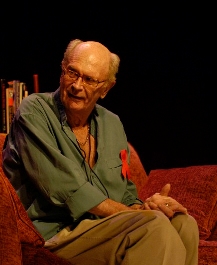|
Reviews of Recent Independent, Foreign, & Documentary Films in Theaters and DVD/Home Video
Directed by Barry Poltermann & Frank Anderson. Produced by Bob Fagan & Wrye Martin. Written by Charles Nelson Reilly & Paul Linke, directed for the stage by Linke. Director of Photography Tony Balderrama. Edited by Poltermann. Music by Anderson. Released by Civilian Pictures. USA. 87 min. Not Rated. Unintentionally or not, directors Barry Poltermann and Frank Anderson heed actress Helen Hayes’s advice to fellow performers: never give the audience 100 %, leave them wanting more. The directors smartly slim down actor/’70s pop culture fixture/director Charles Nelson Reilly’s three-hour one-man show. For a performer who turned banter into an art form, Reilly’s stage production, Save It for the Stage, was the ideal vehicle for his autobiography. Though gone is Reilly’s signature laugh, his calling card on Match Game and Johnny Carson, his irony and razor-sharp wit hit their targets. The directors’ roving cameras filmed his last three performances in 2004. He died in May of this year at 76. Reilly would be the first to admit he had been gone for some time from the limelight. In amusing man-on-the street interviews, at least one man, when asked, had no idea who Reilly was, and many thought he was already dead. But more recently, Reilly had been a director of note, nominated for a 1997 best director Tony for The Gin Game, starring his friend Julie Harris, who considered him a great director. She won a Tony Award playing Emily Dickinson in The Belle of Amherst, directed by Reilly. The raconteur skips over this chapter of his career, as well as his days on Broadway, except for a passing reference to Hello Dolly! and How to Succeed in Business Without Really Trying (he had apparently been keeping his baritone singing voice under wraps since the ’60s). One engaging exception: his recollection of his acting class with teacher Uta Hagen. Geraldine Page, Jason Robards, and Hal Holbrook were just a few of his classmates. Of himself and his peers: “We couldn’t act for s***.” But no prying into his private life. Then again, he was one of the rare name actors who had never been in closet. (In fact, he understudied for Paul Lynde, yet another shatterer of the glass closet, in Bye Bye Birdie.) His achievements are more noteworthy considering that, in the ’50s, he was told by the president of NBC that no queers were allowed on television.
But what the film is really about is his Gothic East Coast family. He was born in the Bronx, the only child of a bickering Swedish mother and an
Irish father, a talented artist but with a weak sense of direction. For every wistful memory, there’s a poison barb, which still sting. Mother to
son: “I should have thrown away the baby and kept the afterbirth.” When his family hits hard times and is forced to move in with his mother’s family,
he hardly exaggerates when he claims that “Eugene O’Neill wouldn’t even get near this family.” If his life were made into a biopic, Reilly, ever the
director, would cast Shirley Booth as his mother; Hume Cronyn, his father; Claire Trevor, his doomed aunt; and matinee idol Burt Lancaster
would read for the role of his handsome funeral-hopping uncle, but still not get the part.
Kent Turner
|

